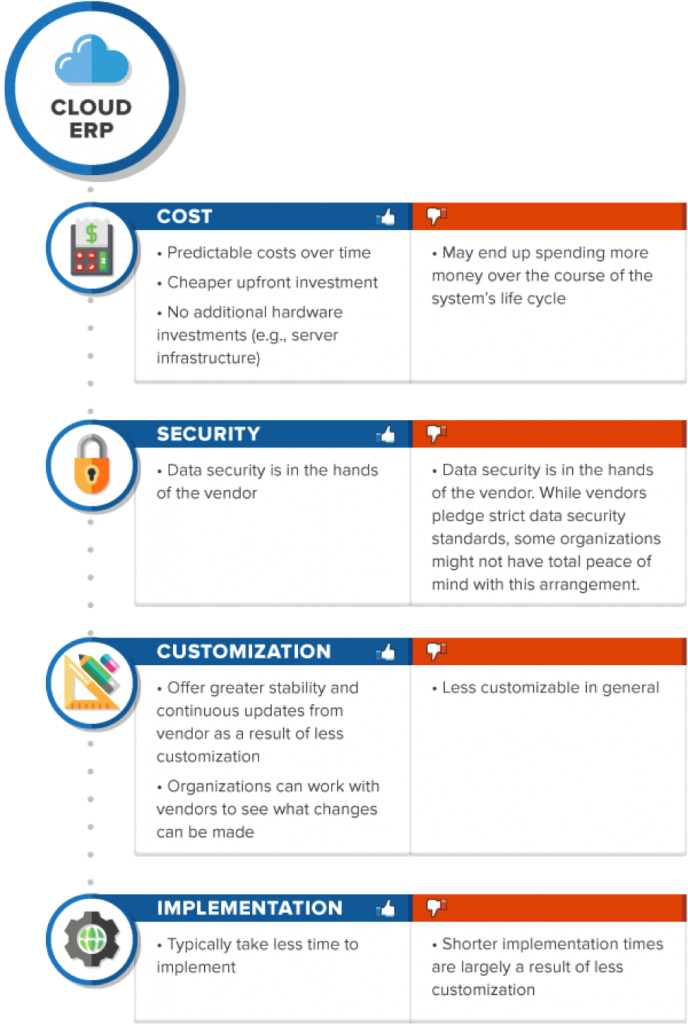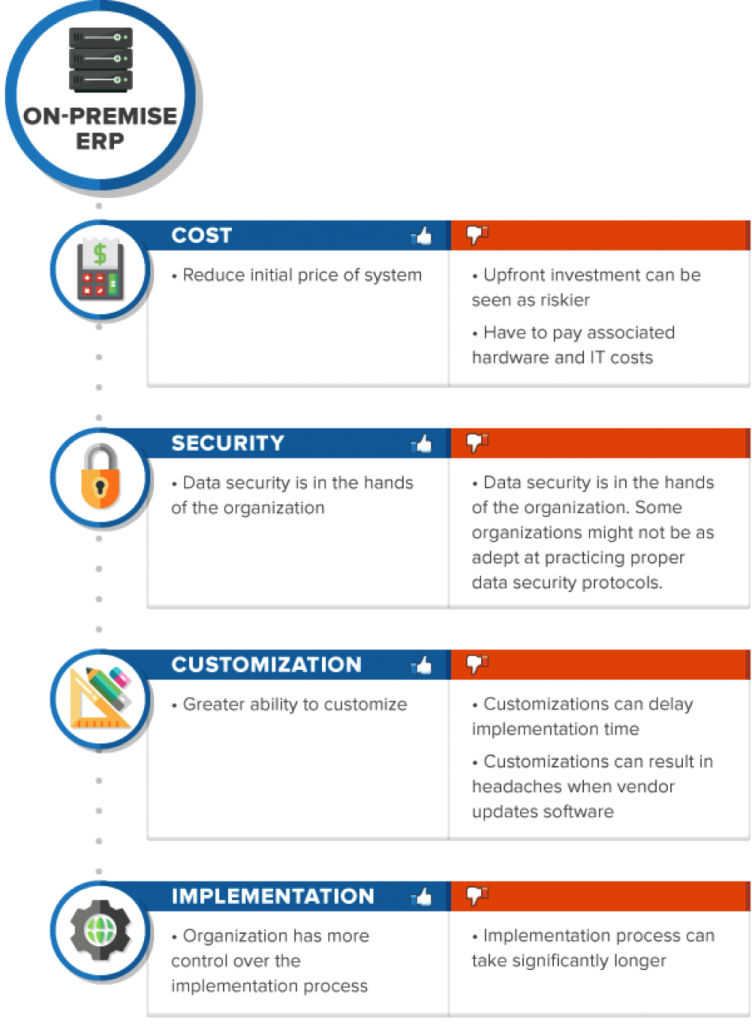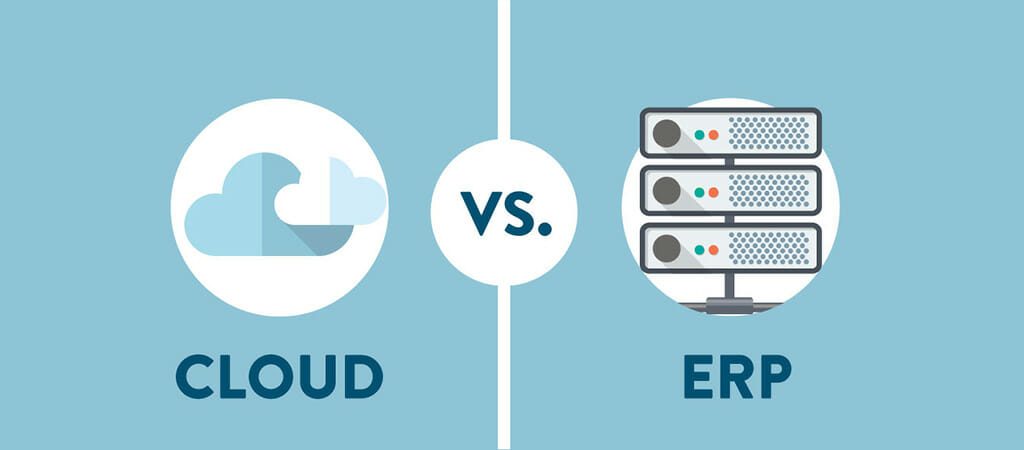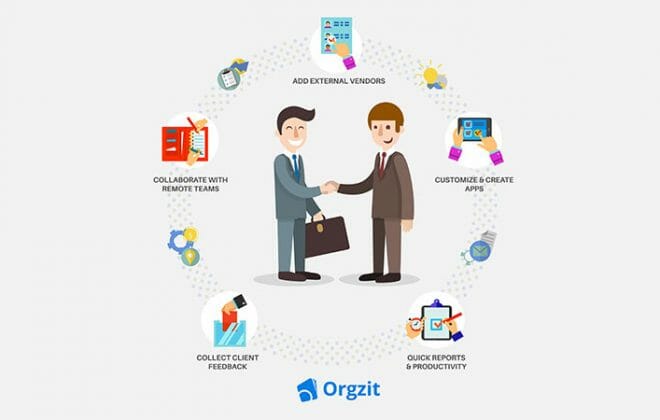Cloud ERP v/s On-Premise ERP: Who wins?
As a business owner, if you ask me where I belong, I would tell you we belong to the cloud. Oh did I say it wrong? I meant crowd! No! I think I was right. It is cloud. All businesses are rapidly migrating to cloud for faster and easier access to their company data, which they further use for team communication and get top of the fly insights to make important business decisions. But when it comes to cloud ERP, the definition becomes a bit sketchy, both from architectural perspective and functional scope.
Many vendors placed under the “cloud ERP” umbrella rarely compete against each other. Some reject or downplay the term. But I am pretty certain that on-premise ERP solution has major benefits.
I came around this article on Software Advice which comprehensively compares Cloud ERP with On-premise ERP. But I am going to talk about it briefly in this article.




In this article where I talk about the major Cloud ERP benefits, I would like to define some metrics to keep it to the point.
- Benefits must visit certain use cases at once.
- Benefits must be able to help an organization in more than one way
- Benefits must be value adding to the end-customer
Top Five Cloud ERP Benefits
Simplicity Counts
I have seen that many small and medium businesses use multiple, and complex standalone software to perform simple work. If you start converging your work files onto a cloud ERP system with an interface that is more aligned to your needs, which solves an immediate business requirement, you will find that interface doesn’t need to be beautiful. It just needs to be succinct enough that enables you to do work quickly and efficiently.
Here is a pain point that makes more sense today – in the cloud-era, than it would have 5 years ago – standalone-era.
We wanted to delay our audit filing, because I thought that our on-premise system is getting too old and outdated… everyone needed to take turns logging into the software… our team’s speed was affected since two people couldn’t see the data at one time… If I needed a file, I needed to log in that particular system and get it… it gets under your skin pretty quick you know. Real-time access is something that helped me access that data whenever and wherever I want.
One place to store information is better than having multiple store points
Inputting data is not going away (or is it?). But storing data at multiple places is something that must go away.
Bharath and his team at 99Tests were in their own version of spreadsheet chaos. Their homegrown system had served them pretty well, but growing pains exposed the problem:
Recently, I just stole a look at my company data and found 10 spreadsheets staring at me… Download this, export this, use this formula and what not… When we found a client who wanted to get their software bug-tested, answering questions became difficult. “How many bugs did your team find in the last week? “Can I see a report?” We simply couldn’t do that just by tracking everything in Excel.
For Mark, a travel agency owner, cloud ERP put them on a better path. He credits the new system with landing some big clients:
Google Adwords isn’t the only lead generation platform for us now. With fancy robust reporting, and itinerary showed in more fancily, we were actually flying. I think it’s helped us in the sales process of getting future clients.
Cloud Apps Are A Favorable Alternative To Complex Customizations
Many people think that cloud ERP is rigidly standardized. Take it from a B2B cloud marketer, it isn’t.
In this API driven market, you can either have an ecosystem of apps resting in your platform or tell people to build their own apps and create an ecosystem of their own business on a certain platform.
I was going through Entrepreneur the other day and read these lines – ‘Most companies use several ERP solutions and struggle to piece together all the data they collect. That is why software companies are working to build platforms that sync various tools and systems in more useful ways.’
Source – 3 Major Enterprise App Improvements to Watch For
I couldn’t agree with it more.
At Business Tech Summit 2017 held last month, prominent industry leaders were stressing the importance of software automation and its impact on the BPO industry. In the process, a few names were raised and Orgzit was one of them.
“Technology is the precursor and enabler to BPO industry’s growth. Faster data accessibility and ready-to-use cloud apps will not only bolster your productivity output but also add that last mile of effort that can help you take your business to the next level.” says Pavan Verma, CTO, Orgzit.
You can hear more from him here.
A Modern UI Is The Source To Get More User Logged-In Time And Greater Employee Productivity
Each year, employees are having a gala of a time picking their favourite tool for their multiple business needs. Because of this, the SaaS owners have started prioritizing UI more than ever. White labelling is becoming more of a SaaS thing than customization. It comes with a click of a button.
Better UX leads to higher productivity. How?
If you are a planner, UX is everything for you. Practicality along with beauty is what planners need right now.
Ana Alaman, director of Open eyes Project, a travel agency based in India, says –
It has been amazing… Right now, it’s probably 90% better… My clients are planners… travel nerds… they love to see the itinerary on the app we use… They also start getting inquisitive, and actually provide valuable feedback through it “When did Mark leave for New Delhi? Looks like India Gate is much fun, is that included in your package?” They love to see the price of every travel pack right there, in their hands. They can see everything.
Increased Data Visibility Leads To A Whole New Way Of Running Business
If you have been doing cloud ERP the right way, the end result is increased visibility – real-time or close to it.
I had a marketer friend working at a finance firm, who migrated from traditional on-premise ERP to Cloud ERP. Here is a snippet of the chat we had in detail when I probed further –
I will be very direct. Our finance team has expressed some level of comfort with the recent migration. They crib less and work more. They get so involved in building custom reports & dashboards that lunch is no more a pass time. I am looking for new work friends now.
On a whole, I think cloud ERP business is going the right way. Let’s wait till the end of 2017 and see what most small and medium businesses are using.
If you liked this write up, go ahead and give Orgzit a try. People have said a lot of nice things about it. You might too. Check out this blog to get a better idea of how powerful is Orgzit and what are its salient features.








